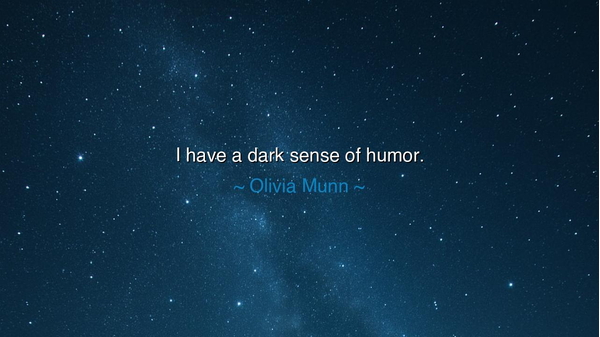
I have a dark sense of humor.






The words “I have a dark sense of humor” by Olivia Munn may seem light and casual, but they conceal a profound truth about the human spirit and its way of surviving pain. To have a dark sense of humor is not simply to laugh at the grim or the forbidden — it is to wield laughter as a shield, to transform suffering into strength. Those who possess such humor do not mock sorrow; they master it. They gaze into the abyss, and instead of despairing, they smile — for they understand that sometimes, the only way to endure life’s cruelty is to find light within its shadows.
From the earliest times, humankind has laughed in the face of darkness. Ancient warriors before battle, knowing death might come with the dawn, would joke around the campfire to keep fear at bay. Prisoners, poets, and prophets alike have found courage in laughter born of pain. The ancients knew this paradox well: that humor is not the opposite of suffering, but its companion. It is the laughter of those who have seen the fragility of existence and still choose defiance. When Munn says she has a dark sense of humor, she stands in this lineage — the lineage of those who refuse to let despair have the final word.
There is strength in darkness, but only for those who can see through it. The dark humorist does not laugh because the world is funny; they laugh because the world is too often tragic, absurd, and cruel — and yet, it goes on. Their laughter is a rebellion against meaninglessness. In war, soldiers often tell jokes about death — not because they love it, but because humor allows them to face what would otherwise crush them. In hospitals, doctors and nurses, burdened by endless suffering, often share grim laughter in whispered tones. This laughter is not disrespect, but release. It is the ancient art of turning pain into something bearable.
History offers us many examples of this truth. Consider Viktor Frankl, the Austrian psychiatrist who survived the Nazi concentration camps. In the depths of horror, he found that humor was a lifeline — that even a single joke, a faint smile amid despair, could restore dignity to the human soul. Frankl wrote that “humor was another of the soul’s weapons in the fight for self-preservation.” Those words echo Munn’s truth: that the dark humorist does not live lightly, but deeply. Their laughter comes not from ignorance of suffering, but from its intimate acquaintance.
There is, too, a kind of wisdom in dark humor — a recognition of life’s contradictions. Those who have such humor understand that the world is both beautiful and brutal, that joy and tragedy coexist in every heartbeat. To laugh in the dark is not to deny suffering, but to accept it fully, and still affirm life. This is not the laughter of mockery but of resilience, the humor of those who, though broken, refuse to be defeated. It is the same wisdom that allowed ancient philosophers to smile at fate — to find serenity not in avoidance, but in understanding.
And yet, dark humor carries a warning. It must be tempered with compassion. If it becomes cruel or cynical, it ceases to heal and begins to wound. The ancients called this balance “eutrapelia” — the virtue of measured wit, the art of knowing when laughter enlightens and when it harms. True dark humor, like fire, can warm the soul or burn it; it must be handled with care. The wise use it to illuminate truth, not to obscure it.
So, dear listener, take from Olivia Munn’s simple confession this deeper lesson: do not fear your darkness; learn to laugh through it. Let humor be your lantern when the path grows dim. When pain finds you — and it surely will — remember that laughter is not denial, but defiance. It is the song of the enduring spirit, the whisper that says, “I still stand.” Laugh with empathy, laugh with awareness, laugh not to escape life, but to embrace it. For in that dark laughter lies the most ancient form of courage — the kind that transforms suffering into wisdom and survival into art.






AAdministratorAdministrator
Welcome, honored guests. Please leave a comment, we will respond soon